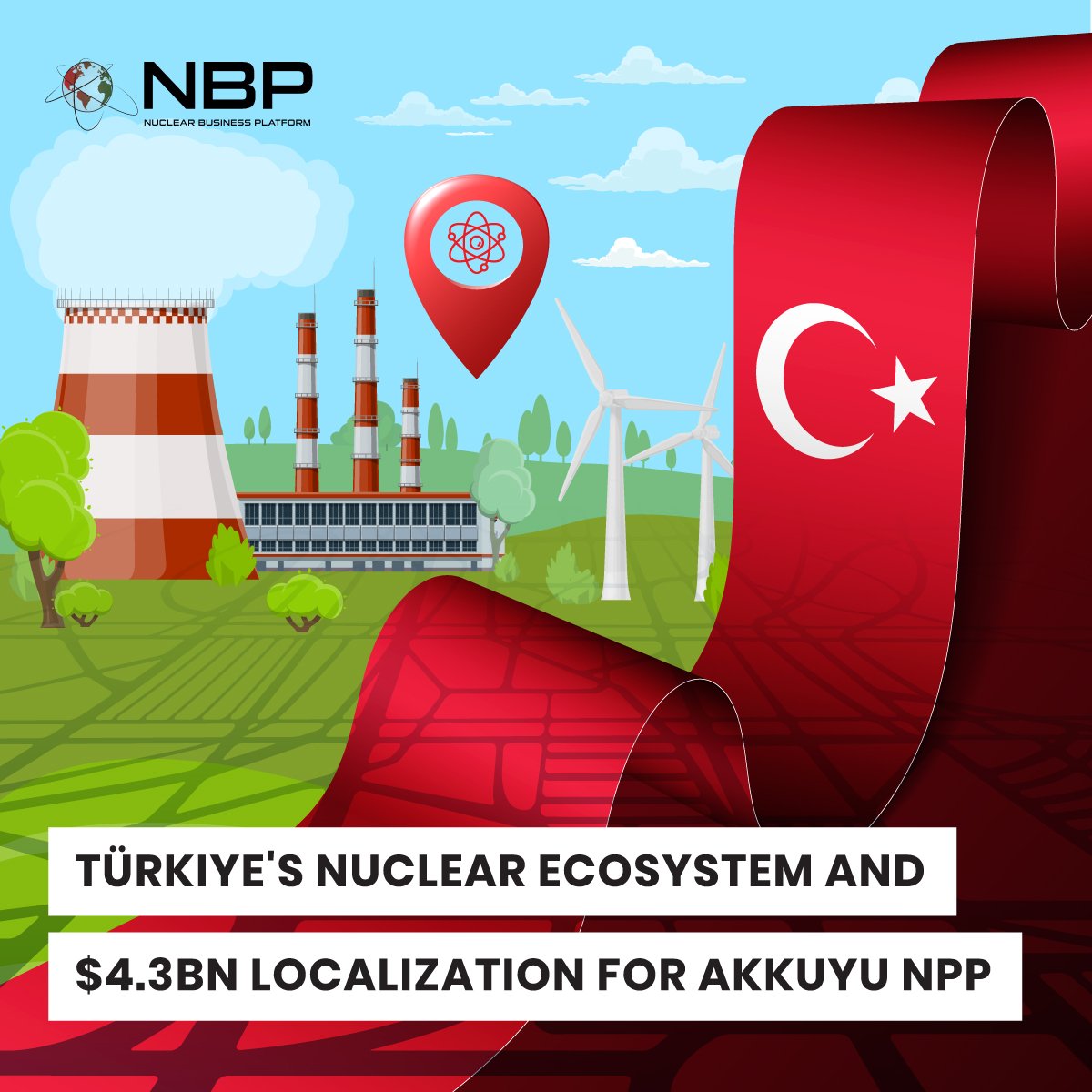Türkiye's Nuclear Ecosystem and $4.3bn Localization for Akkuyu NPP
The establishment of an industry typically spurs growth across other sectors, and the construction of a Nuclear Power Plant (NPP) is no exception. As Türkiye prioritizes nuclear energy and progresses with the construction of its first NPP, the Akkuyu NPP, equipped with a VVER-1200 reactor boasting a capacity of 4*1200MW, alongside ongoing negotiations for the second and third NPPs, it's evident that Turkish markets and industries will experience direct and indirect benefits from these decisions.
Türkiye possesses a localization target for the Akkuyu NPP. According to Mr. Salih Sari, Acting General Director of Nuclear Energy and International Projects at the Ministry of Energy and Natural Resources, “We have reached a localization of 4.3 billion USD, or 47 percent. In addition, we aim to gradually increase this rate in other NPP projects and eventually to reach the point of self-sufficiency in all areas of the nuclear industry in the next 30 years.” It signifies Türkiye's commitment to developing its domestic industries.
During the construction phase of a NPP, various industries experience direct and indirect benefits, contributing significantly to economic growth. According to data from the International Energy Agency (IEA), industries such as construction, engineering, and manufacturing are directly involved in building the plant. Meanwhile, sectors like transportation, logistics, steel production, concrete manufacturing, and various service industries also benefit indirectly from the construction process.
Türkiye's manufacturing sectors demonstrate strength in producing a wide range of materials and components required for nuclear energy projects. For example, Türkiye's cement industry has showcased remarkable growth, positioning itself as a key player globally. With an output of approximately 85 million metric tons in 2022, Türkiye ranks fifth among the world's leading cement producers. From 2011 to 2022, the industry's production capacity surged from 65 million TPA of clinker to 54.2 million tons, with forecasts projecting a production volume of 100 million tons within the next decade.
Similarly, Türkiye's iron and steel industry plays a pivotal role in the nation's economy, with a consumption of 12.251 million tons in 2022. Despite a production capacity of 10.85 million tons, Türkiye still imports iron and steel products worth $25.6 billion to meet demand. However, exports of $15.7 billion in 2022 position Türkiye as the 12th largest exporter globally.
The electrical generators industry in Türkiye is expected to witness significant expansion, with a projected market size of US$18.82 billion by 2028, reflecting a growth rate of 10.51% from 2024 to 2028. Additionally, the transportation and logistics sector, valued at USD 64 billion, anticipates a compound annual growth rate (CAGR) of over 4%, with investments totaling USD 198 billion by 2053 to enhance infrastructure.
In Europe, Türkiye stands as the sixth-largest producer of industrial valves, with a market expected to register a CAGR of 6% during 2021–2026. Moreover, the Türkiye electrical materials market and the Wires & Cables Market are poised for growth, with estimated CAGRs of 6.50% and growth during 2020-2026, respectively.
Despite a decline of -12.58% in value shipments in 2022, the Türkiye Transformer Market is projected to grow at a CAGR of 3.6% during 2024-2030. Similarly, the Türkiye Industrial Batteries Market, witnessing a growth of 24.71% in value shipments in 2022, is expected to grow at a CAGR of 3.6% during 2024-2030, reaching an estimated revenue of approximately 1.047,8 million U.S. Dollars by 2023.
As 56% of Türkiye’s electric power generation capacity consist of renewable energy, including hydroelectric, wind, solar, geothermal, and biomass power plants, making Türkiye the fifth-largest generator of renewable energy in Europe and the 11th largest in the world, the aforementioned industries would have seriously influenced and took part in the construction of the clean energy power plants.
Economic Growth and Workforce Development
Nuclear energy stands as a pivotal driver of job creation, exerting a profound influence on economies across diverse sectors. Employment opportunities within the nuclear industry span the entire lifecycle of a NPP, from initial planning and construction to operational management, supply chain logistics, and eventual decommissioning. In Türkiye, the Akkuyu NPP project epitomizes the nation's nuclear ambitions, poised to deliver substantial economic and employment benefits.
During the construction phase alone, the Akkuyu NPP project is projected to generate upwards of 25,000 new jobs, with an impressive 80% of the workforce composed of Turkish citizens. This surge in employment not only represents a significant boost for local labor but also holds the promise of substantial economic gains. Estimates suggest that the project will infuse approximately 50 billion USD into the economy, fueling local job growth and precipitating a population increase of 30,000 individuals. This demographic expansion underscores the broader socio economic ramifications of the project, extending beyond direct job creation to stimulate secondary growth within the community. The ripple effect of employment creation is evident, with each job generated at the construction site catalyzing the creation of an additional 10 jobs in related sectors.
Opportunities for Global Collaboration
Türkiye's pursuit of nuclear energy, exemplified by projects like the Akkuyu, Sinop, Thrace NPPs reflects its aspirations for economic advancement and energy sustainability. While significant progress has been made, there are critical areas that demand attention to fully unlock the potential benefits.
The construction of the Akkuyu NPP presents a unique opportunity for job creation and economic stimulation. However, there is a notable gap in nuclear workforce development. Türkiye must prioritize training and upskilling programs to equip its workforce with the necessary expertise to actively contribute to nuclear projects, since it is necessary for the country’s upcoming NPPs as well. Therefore,it engenders avenues for local and international training and human capital development enterprises to align with the burgeoning Turkish nuclear ecosystem, fostering the cultivation of proficient personnel across diverse sectors.
Furthermore, Türkiye's dependence on imports for key sectors like iron and steel underscores the importance of developing domestic capabilities, which is essential not only for ensuring stability but also for fostering economic independence and resilience.
To address these challenges, global businesses and organizations can play a pivotal role. By collaborating with Turkish counterparts and investing in localization efforts, they can facilitate technology transfer, knowledge sharing, and skills development. Moreover, international partnerships can help Türkiye access advanced expertise and resources necessary for workforce training and industry growth.
Global businesses have the chance to tap into lucrative opportunities within Türkiye's nuclear energy sector. With the nation targeting a significant increase in nuclear capacity to 20,000 MW by 2050, encompassing both large NPPs and potential Small Modular Reactors (SMRs) programs, there exists a platform for establishing mutually advantageous partnerships. By capitalizing on Türkiye's strategic location, skilled workforce, and expanding market potential, companies can forge alliances that not only benefit their bottom line but also contribute to corporate social responsibility endeavors and foster sustainable long-term development initiatives within the country's nuclear projects.



